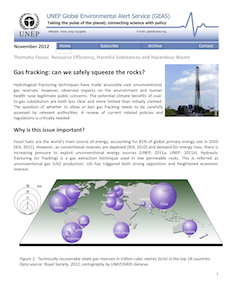 The United Nations Environment Program (UNEP) has issued a Global Environment Alert because of the considerable environmental and health challenges presented by fracking.
The United Nations Environment Program (UNEP) has issued a Global Environment Alert because of the considerable environmental and health challenges presented by fracking.
“The question of whether and how to allow fracking merits careful review of laws, regulations, and impacts on environment and health.
“The UNEP Alert states that this unconventional gas (UG) extraction technique presents environmental risks, despite economic or energy security benefits, including: air, soil, and water contamination; water usage competition; ecosystem damage; habitat and biodiversity impacts; and fugitive gas emissions.
“The Alert highlights public health risks, including: explosion from pipeline construction; release of toxins into air, soil and water; and competition for land and water needed for food production. The document raises concerns about lack of disclosure requirements for fracking chemicals, and suggests known fracking chemicals affect aspects of human health ranging from the immune system to the nervous system, and could cause cancer and mutations.
“The UNEP Alert makes the case that lessening dependency on fossil fuels would be less risky than continuing UG development.
“The Alert poses technical considerations for fracking, including: avoiding fracking in areas of water scarcity, dense population or agriculture”
 The Alert warns of risks even if fracking is done properly:
The Alert warns of risks even if fracking is done properly:
“Some risks result if the technology is not used adequately, but others will occur despite proper use of technology”
The UNEP Alert concludes that existing regulations are insufficient. The report concedes that UG is likely to grow with energy demands, but remains a stop-gap measure in a transition to a low-carbon future.”
- Note that energy demand in the densely populated and farmed UK is falling, and in 2014 was lower than at any time since before 1970.1
1. Energy consumption in the UK – DECC
